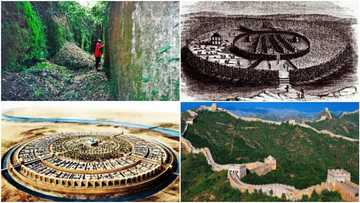Ibrahim Njoya created special African writing system
- Before the French came to Cameroon, King Ibrahim Njoya of Bamum kingdom had developed a traditional writing system
- To encourage usage, he built schools and made sure it was used to teach pupils
- When the French colonisers came, they destroyed his writing system, setting back years he had invested in educating his people
PAY ATTENTION: Win a prize of N115,000, N75000 or N38000: participate in Big Naija Independence contest by Legit.ng
The story of King Ibrahim Njoya, the ruler of Banmum, an ethnic group in Cameroon in the 17th century, goes to show that Africans were sophisticated in their ways before colonialism.
Theafricanhistory.com reports that the culture and customs of the ethnic group were preserved before the reign of the king via oral transmission.
Njoya brought about a special alphabet system that mixed both the Vai scripts with Arabic as a way to document the ways of his people.

Read also
Breaking: I won’t sign off 2021 budget without compensation for EndSARS victims - Gbajabiamila
It should be noted that his writing system was a pictogram before he worked more on it and came up with 70 distinct characters.
That was how the writing system known as A-ka-u-ku came about, serving as a better alternative to the oral system of cultural preservation for the Bamum people.

Source: UGC
To make the language more accepted, Njoya created schools and made sure it was the language of instruction.
He was a friendly person to the Germans but when the French took over after World War I, everything changed.
The French came with their own set of ways, using the policy of assimilation and went after King Njoya’s language system as they destroyed many books he had written.
He was exiled to Yaounde in 1931 where he later died three years after. The French invaded Fumban, which was the kingdom’s capital then.
PAY ATTENTION: Download our mobile app to enjoy the latest news update

Read also
Facts about the ancient walls of Benin which are longer than Great China Wall and how the British destroyed them (photos)
Meanwhile, Legit.ng earlier reported that emerging facts showed the Benin Kingdom, one of the oldest cities in Africa, as one of the wonders of the world before the modern age.
It was gathered that the wall of the kingdom was razed during the 1897 expedition, adding that the act really affected the history of Benin and the proof that there were African civilisations before modernism.
For more than four centuries, the walls were a fortress as it protected the people of Edo and their civilization. The walls were four times longer than China’s Great Wall.
Onilua of Ilua: 140-yr-old man is regarded as oldest king in Nigeria | Legit TV
Source: Legit.ng


